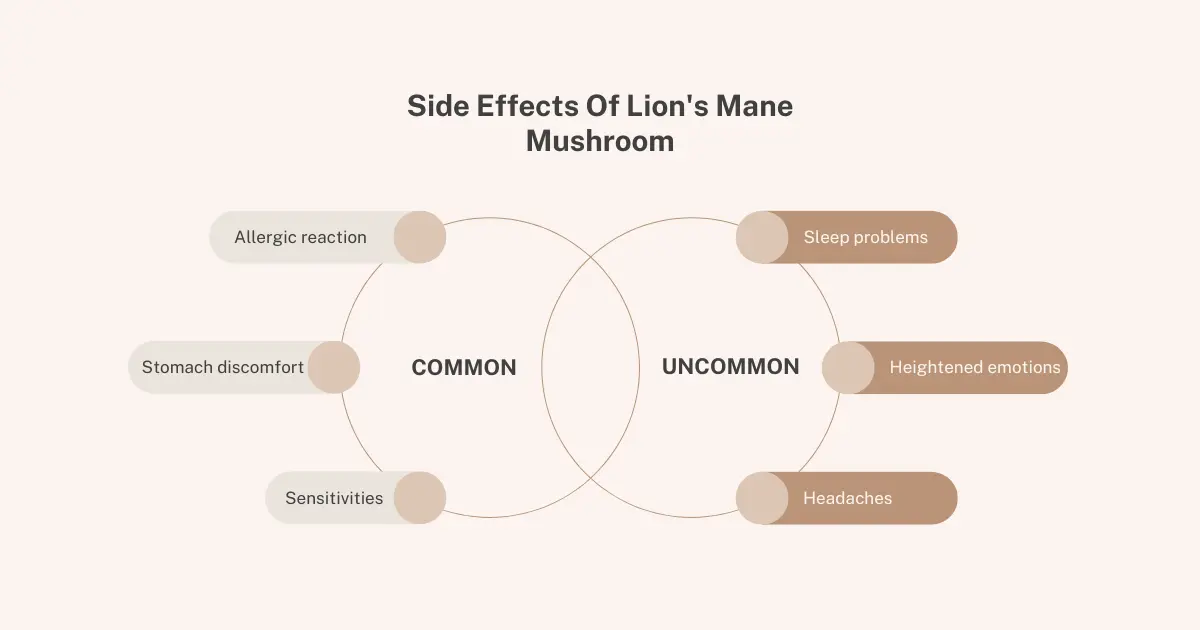What Is Lion’s Mane Mushroom?
Lion’s mane mushrooms, or Hericium erinaceus, appear in white fluffy clumps similar to a lion’s mane. It belongs to the tooth fungus species known to grow in North America, Europe, and Asia. They grow in a single clump of spines along tree trunks.
If you spot these, you can harvest the fruit and incorporate them into any dish.
Another consumption option is to take lion’s mane supplements or as a nootropic. These can be incorporated any time of day since lion’s mane are herbal fungi that don’t contain psychedelic chemical properties.
They aren’t classified as the strongest magic mushrooms and are used daily for consumption among individuals. The mushrooms provide positive properties to the mental and physical functions of the body. Several individuals enjoy taking fungi to enhance certain bodily functions that allow them to go through life smoothly.
Studies are done on the effective interaction between the lion’s mane and the human body that pushes others to try the shroom for their internal functions.
Lion’s mane was used for centuries, giving different cultures an edible mushroom.
The ancient Chinese and Japanese cultures used mushrooms to supplement their nutritional needs to provide overall health and longevity. It was used as medicine in Chinese cultures, and many added mushrooms to teas. The first cultivation of the mushroom occurred in the late 1980s. This article explores lion’s mane mushroom users, side effects, and other critical factors for users to gain insight into.
Uses Of Lion’s Mane Mushroom
The lion’s mane has many uses to enhance mental clarity and focus. The uses are either medicinal or culinary, allowing individuals to ingest the mushroom in different forms.
Culinary Uses
Many put lion’s mane mushrooms in culinary dishes to receive the unique compounds. The mushroom can be sauteed or roasted, merging with oil to enhance flavour. Placing other herbs along with the lion’s mane can increase the complex taste and dish. When preparing lion’s mane, you can incorporate it into spaghetti, Thai, Chinese food, and pizza dishes.
Lion’s mane is also incorporated into supplements, nootropics, and infused inside beverages for an added benefit. A good culinary way to consume it is by adding the powder to coffee or using creamers infused with the mushroom.
Medicinal Uses
Lion’s mane has medicinal uses, allowing individuals to smooth out their unstable functions and cells in the body. It’s known to increase awareness of cognitive functions, strengthen focus and soothe pangs throughout the body. Many studies have been done with lion’s mane mending Alzheimer’s symptoms in patients.
Alzheimer’s is a neurogenerative disorder affecting older individuals’ problem-solving, memory, consciousness, language, and reasoning.
The mushroom’s compounds work with functional neurons in the brain to decrease spatial memory and improve cognitive performance, according to Behavioral Sciences, “Lion’s Mane (Hericium Erinaceus) Exerts Anxiolytic Effects In The Rtg4510 Tau Mouse Model.”
Many use lion’s mane for other medicinal uses that increase their daily productivity.
More research is needed to analyze further the mushroom compounds interaction in the mind and body.
Cosmetic Uses: (If Applicable)
Lion’s mane can be incorporated into cosmetics and routine skin treatments to alleviate aging. Lion’s mane is reported to enhance skin complexion by inhibiting TLR4-JNK signalling that minimizes inflammation, according to the International Journal of Medicinal Mushrooms, “Potential Activity of Aqueous Extract of Culinary-Medicinal Lion’s Mane Mushroom.”
Knowing lion’s mane mushrooms can soothe redness underneath the skin, allowing users to utilize the fungi for their daily routines.
10 Health Benefits Of Lion’s Mane Mushroom
Supports Brain Health
Lion’s mane supports brain health by working with critical functions within the brain.
A study was done on how Hericium erinaceus compounds affect the brain by growing and forming new connections of neurons.
The magic mushroom compounds were focused on the hippocampus area, responsible for learning and forming memories, that allowed neurons to grow after exposure, according to the Journal of Neurochemistry, “Hericerin Derivatives Activates A Pan-Neurotrophic Pathway In Central Hippocampal Neurons Converging To Erk1/2 Signaling Enhancing Spatial Memory”.
This allows us to identify how well the mushroom interacts with the brain and provides a solution to those having consistent memory loss.
Enhances Cognitive Function
Along with supporting the brain, Lion’s mane can enhance cognitive function, making users go about their day with minimal interruptions. The mushrooms were reported to affect neural networks in the brain and improve cognitive functions through oral intake, according to the National Library of Medicine, “Improvement Of Cognitive Functions By Oral Intake Of Hericium Erinaceus.”
Several studies need to be done to analyze further the role of Lion’s mane on critical cognitive functions.
Promotes Nerve Growth Factor Production
Lion’s mane promotes nerve growth factor production in the brain, allowing users to remember and learn easily. Lion’s mane induced the Nerve Growth Factor (NGF). The International Journal Of Medicinal Mushrooms promoted neurite outgrowth, “Neurotrophic Properties Of The Lion’s Mane Medicinal Mushroom, Hericium Erinaceus (Higher Basidiomycetes) From Malaysia.”
NGF is responsible for the growth and development of central and peripheral neurons within the body that influence learning and memory.
Helps In The Repair And Regeneration Of Neurons
Lion’s mane can also repair and regenerate neurons by working with the cognitive functions in the brain. As we mentioned earlier when consuming the mushroom, the compounds inside work with neurons to grow and develop over time. More studies need to be completed to understand further the connection between neurons and chemical compounds in lion’s mane mushrooms.
May Provide Neuroprotective Effects.
Lion’s mane can also provide neuroprotective effects within individual neural pathways. Lion’s mane or Hericium erinaceus is known to provide neuroprotective effects with the hypothalamus and serum regions, allowing for a potential to treat neurodegenerative diseases according to the International Journal of Molecular Sciences, “The Neuroprotective Properties Of Hericium Erinaceus In Glutamate-Damaged Differentiated Pc12 Cells And An Alzheimer Disease Mouse Model”.
The study was done on mice, but the concept of the mushroom potentially treating unstable neuron properties is still valid since humans have similar properties.
Many with deficiencies in specific brain functions can utilize a lion’s mane to combat them.
Reduces Symptoms Of Depression And Anxiety
Lion’s mane can minimize symptoms of depression and anxiety, making users experience relief from their usual chaotic interruptions within their mental and physical functions. The mushroom works with critical areas in the brain to provide well-being that isn’t encountered by emotional turmoil and anxiousness.
Supports The Immune System
It can also support the immune system, giving individuals their full vitality.
In an animal study, a Lion’s mane was reported to support the immune system by enhancing activities within the intestinal immune structure.
Ultimately, the interaction may protect against pathogens entering the gut through other body areas, according to Food & Function “Immunomodulatory Effects Of Hericium Erinaceus Derived Polysaccharides Are Mediated By Intestinal Immunology.”
The intestinal immune system isn’t as sought after as other body systems, but it’s the largest compartment of our immune system that needs attention.
Possesses Anti-Inflammatory Properties
The mushroom provides anti-inflammatory properties that can enhance our internal functions. Inflammatory responses are where areas in the body become red and inflamed, making it hard to conduct certain activities throughout the day.
Utilizing a lion’s mane to combat the negative response can provide relief over time.
Demonstrates Antioxidant Properties
Lion’s mane delivers antioxidant properties that allow the body to generate new cells.
When cell degradation occurs more rapidly than normal, it can lead to undesirable appearances and chronic conditions. Antioxidants come in to provide electrons to free radicals in the body to minimize the oxidation process, according to Harvard Education, “Antioxidants.” Medicinal mushrooms can support cell breakdown by providing antioxidant compounds to them.
Exhibits Potential Anticancer Properties
It’s also known to exhibit anticancer properties for those suffering from the condition.
A study done in 2014 reported that Hericium erinaceus extracts may potentially treat gastrointestinal cancers within the liver, colorectal, and gastric, according to the Journal Of Ethnopharmacology, “Anticancer Potential Of Hericium Erinaceus Extracts Against Human Gastrointestinal Cancers.”
Side Effects Of Lion’s Mane Mushroom
There are a few side effects of lion’s mane mushrooms you should know about before using the fungi. There aren’t too many side effects since the mushroom is generally considered safe to use.

These uncommon side effects vary from person to person and aren’t typically common for users to experience. The side effects may affect some users, whereas they won’t affect others. By testing to see if you’re allergic to the mushroom, prepare to do a test. Place a small amount on the skin and rub to see if your skin reacts negatively to it.
Those who are allergic and sensitive to lion’s mane need to stay away from using the mushroom for daily use. Making sure to avoid taking too many mushrooms is essential to keeping you safe as well.
A good dosage is between 500-1000 mg daily to get enough of the mushroom without getting too much in your system. You can also start small and slowly increase the amount to the desired results. Another safety precaution is to avoid mixing other OTC drugs and substances with lion’s mane, which can prove detrimental.
The Bottom Line
Lion’s mane can be incorporated daily to add to culinary dishes that appeal to the palate. They are ideal mushrooms for beginners, unlike magic mushrooms.
There are several dishes to create with an infusion of lion’s mane that can make taking the mushroom enjoyable. Many users also utilize it for medicinal uses to enhance their mental and physical functions of the body.
The mushroom can be good for various mental and physical conditions.
Lion’s mane mushrooms are also different than Golden Teacher Mushrooms since they’re not psychoactive. They don’t provide the psychedelic sensation upon consumption. Knowing the difference between lion’s mane and magic mushrooms can give you insight into what you want to ingest in your diet. Lion’s mane doesn’t require you to prepare for a mushroom trip either and can make it easier for you to consume for your lifestyle.
Are Lion’s Mane Mushrooms Good For You?
Yes. The mushrooms are good for you to consume daily or weekly, taken in certain dosages for your body type. They provide the mind and body with a boost of energetic focus, allowing for a more productive outcome during daily tasks. There are many other benefits of lion’s mane that may provide relief.
Does Lion’s Mane Improve Memory?
Yes. Lion’s mane may potentially improve memory due to the chemical compounds it contains. The mushroom works to target areas of the brain to alleviate memory loss.
Is Lion’s Mane Good For ADHD?
Yes and no. A study on lion’s mane has the potential to support cognitive functions that may benefit ADHD. Still, no actual studies show the mushroom can impact the dopamine compound that is the primary neurotransmitter responsible for ADHD results, according to IBCCES, “The Truth About Lion’s Mane, Psychedelics & Caffeine.”
More research needs further to analyze the correlation between lion’s mane and ADHD.
Is Lion’s Mane Legal In Canada?
Yes. The mushroom legal status of lion’s mane is legal in Canada, and you can usually spot the mushroom being sold in health food stores and online retail stores.
Does Lion’s Mane Interact With Medications?
Yes. It’s possible lion’s mane can interact with other medications such as high blood pressure, blood condition-related, and diabetic medications. Speaking with a health professional before using lion’s mane daily is essential.
How Is Lion’s Mane Mushroom Typically Consumed?
You can consume lion’s mane in a supplement, nootropic liquid, raw, in beverages like coffee, and cooked in culinary dishes.
Is Lion’s Mane Mushroom Safe For Pregnant Or Nursing Women?
It’s not known. There isn’t enough information on whether lion’s mane is safe for pregnant and nursing women. Some suggest it’s generally safe for them to consume and may be beneficial, whereas others recommend avoiding it due to the unknown long-term use. Speaking with a health professional is best before considering using lion’s mane mushrooms.
What Is The Recommended Dosage Of Lion’s Mane Mushroom?
An average recommended dosage is between 500-1000 mg daily, which may depend on an individual’s weight and physical status.
How Should Lion’s Mane Mushroom Be Stored?
Store the mushrooms in an airtight container in a cool, dark place to maintain freshness and avoid them going bad.
Are There Any Known Allergies To Lion’s Mane Mushroom?
Yes. A known case was reported by a 43-year-old male having stomach pangs, hives, swelling, and gastrointestinal discomfort after consuming lion’s mane, according to Annals Of Allergy, Asthma, And Immunology, “Dangers At The Dinner Table“ A Report Of Anaphylaxis To Lion’s Mane Mushroom.”
Can Lion’s Mane Mushroom Be Grown At Home?
Yes, you can grow lion’s mane mushrooms at home. The best way to start is using a kit with all the necessary materials to grow it without much effort.




